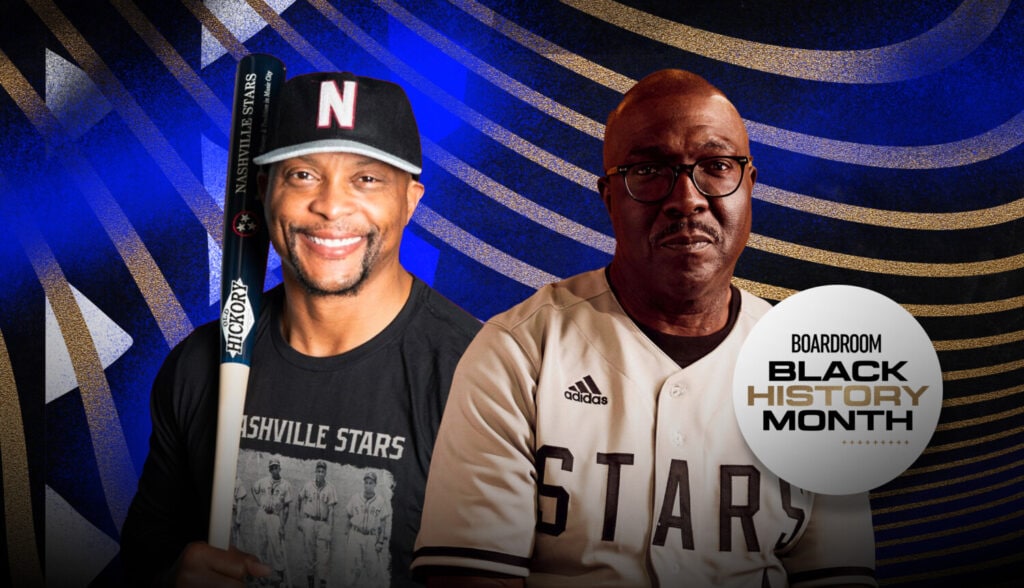Bob Kendrick and Eddie George discuss Music City Baseball’s efforts to bring an MLB team to Nashville named after its old Negro Leagues club.
At his annual spring training press conference last week, Major League Baseball Commissioner Rob Manfred said his current term in charge, which ends in January 2029, would be his last. From the time he began his tenure in charge in 2015, he said that MLB would only consider adding expansion teams for the first time since 1998 once stadium situations for the Tampa Bay Rays and Oakland Athletics were resolved.
It appears that time has come. An extremely flawed plan to keep the Rays in St. Petersburg with a $1.3 billion stadium opening in 2028 was approved. And the wheels are tenuously in motion for the A’s to move to Las Vegas, though that merits a larger discussion we won’t get into here. But for cities looking to break into Major League Baseball, the opportunity finally seems realistic.
In 2019, Music City Baseball formed as a group looking to bring an MLB team to Nashville, choosing the same Nashville Stars brand that was used in the Negro Leagues in the 1940s and 1950s as their team name. Over the past four-plus years, the prospective group led by Managing Director John Loar has made inroads within the local community and in baseball circles to the point where Nashville is widely viewed as the city most likely to be chosen if and when MLB expands. The Stars will aim to bring Black ownership into the fold in a meaningful way, with Negro Leagues Baseball Museum President Bob Kendrick and former All-Pro running back Eddie George both members of the team’s Board of Directors.
When Loar first told Kendrick the idea of naming the team the Stars, Kendrick called it a stroke of genius.
“In 20, 25 years from now, I’ll be lying and swear it was my idea,” Kendrick told Boardroom.
George spent seven years with the Tennessee Titans franchise in Nashville and still calls the city home, helping bring Nashville a Major League Soccer expansion team that began play in 2020. He met Loar and former MLB All-Star Dave Stewart and thought it was a great opportunity to not only bring baseball to one of America’s fastest-growing cities but also potentially bring much-needed diversity to the game.
“Nashville has been constantly growing since I’ve been here as a Titan,” George told Boardroom, “and to fulfill the need for more representation for people of color was really appealing.”

For Kendrick, Nashville’s momentum as an expansion prospect dovetails with growing awareness for the Negro Leagues. A five-year partnership with Sony PlayStation‘s MLB The Show brought the storied history of a league that’s celebrating the 100th anniversary of the first Negro Leagues World Series to millions of young gamers worldwide. The popularity of the Negro Leagues’ inclusion in the video game, featuring video documentaries narrated by Kendrick, proved to him that young fans are far more interested in baseball history than they’re given credit for.
“It’s very important how history is presented to them,” Kendrick added. “All summer last year when the game was released, scores of people came to the museum because they saw it in the video games and then they wanted to meet the man that was telling those stories.”
While the Stars aren’t yet featured in The Show, they could be coming to an MLB ballpark near you over the next several years. This week, Music City Baseball hired construction and real estate development firm Mortenson to conduct a market analysis for potential ballpark sites. George said the group is looking at three sites in Davidson County, home to all of Nashville’s pro sports teams, one in Williamson County, and one in Rutherford County.
Like a vast majority of stadium projects in the US, public financing could potentially become an issue over time. Suburban Williamson or Rutherford Counties may show more openness to that plan than Davidson, George said, where there was a contentious fight over public funds for a planned new Titans stadium.

In addition to a market site analysis and further building up the Nashville Stars brand, Music City Baseball’s top 2024 priority is finding a majority owner and general partner who understands the local community, loves sports, and is able to help drive home the importance of Nashville as a future MLB market. A baseball team should be a pillar of a community, George said, not just a revenue generator but an organization that brings people together.
That Music City Baseball wants to be a local community pillar and have minority representation in ownership and executive leadership made the project all the more appealing to Kendrick, who had no prior ties to Nashville before joining the group.
“Representation does matter,” Kendrick said. “And this gives us an opportunity to do something tremendously groundbreaking that falls right in line with what we believe Major League Baseball wants to see take place. We know that there’s work to be done in the front office, and we also know that there’s work to be done from a managerial and coaches’ standpoint. This would be a very exciting, great step toward that goal.”
What would it mean to Kendrick to one day sit in Nashville’s owner’s box and see players run out of the dugout in a Nashville Stars uniform, permanently representing the Negro Leagues in the MLB?
“It would be a very proud moment,” he said, “not just for me, but for every steward of the story and all the players past and present. I don’t know if there could be a greater honor than to have the Negro Leagues perpetuated in this manner. We would all look very fondly and very proudly when this time does take place and God willing, I’ll be around to see that happen.”
